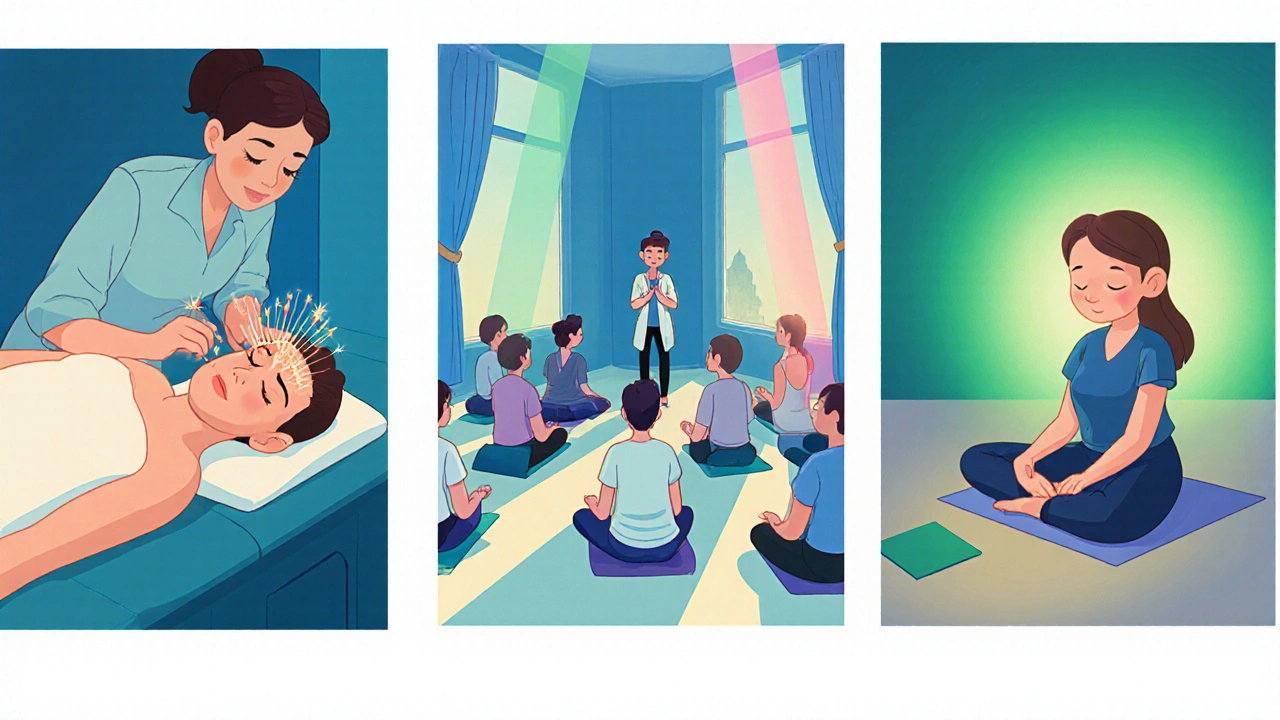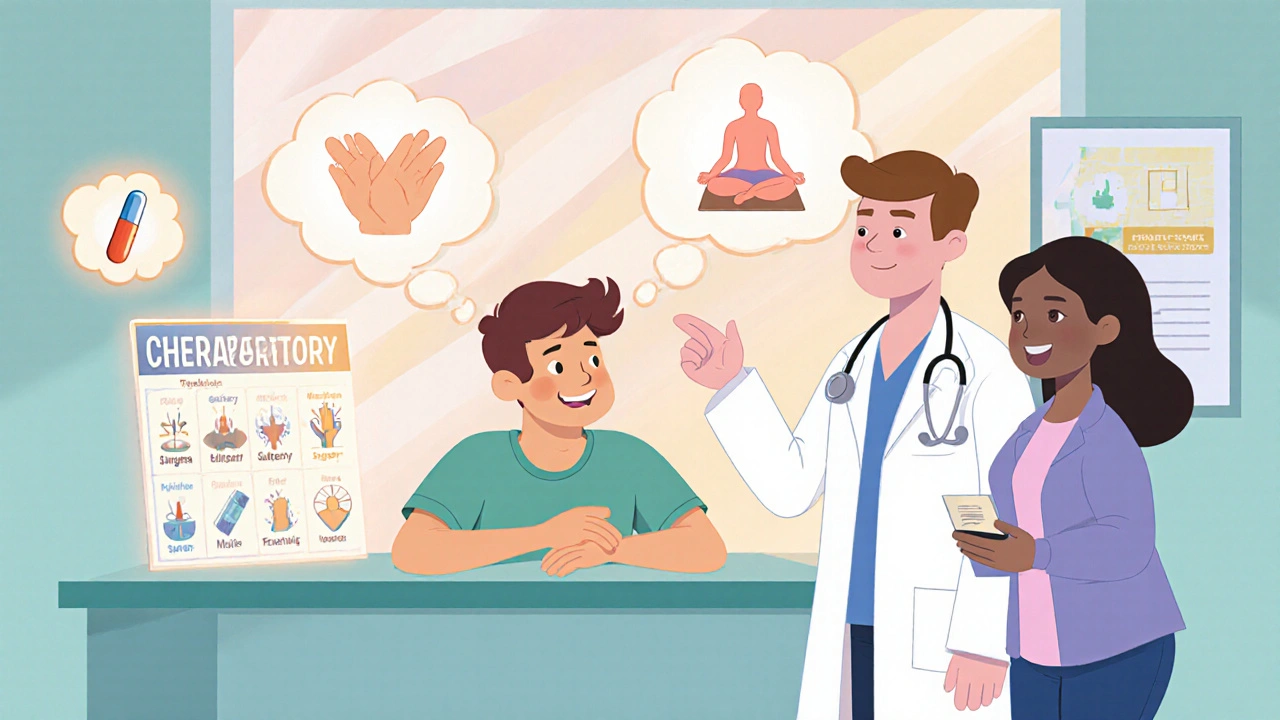When you or a loved one is diagnosed with liver cancer, the treatment plan can feel overwhelming. Chemotherapy, surgery, and targeted drugs are the main players, but many patients also wonder about complementary therapies - can they really help, or do they just add confusion?
Key Takeaways
- Complementary therapies are safe when coordinated with your oncology team.
- Evidence varies: acupuncture and mindfulness have the strongest data for symptom relief.
- Herbal remedies can interact with liver‑metabolized drugs; always disclose use.
- Integrative oncology programs, like those at major cancer centers, provide structured support.
- Start simple, track outcomes, and adjust based on what works for you.
What Exactly Are Complementary Therapies?
Complementary therapies are non‑medical practices used alongside conventional cancer treatment to improve quality of life, manage side effects, or boost emotional well‑being. They differ from “alternative” approaches, which replace standard care entirely-a risky move for a disease as serious as liver cancer.
Liver Cancer 101
Liver cancer refers to malignant growths that originate in liver cells (hepatocellular carcinoma) or spread from other organs. In 2024, Canada recorded roughly 2,400 new cases, with a five‑year survival rate hovering near 20% when diagnosed late. Early detection, surgical resection, ablation, and systemic therapies such as sorafenib or atezolizumab‑bevacizumab constitute the standard of care.
Why Patients Turn to Complementary Options
Side effects from chemo, immunotherapy, or radiation-fatigue, nausea, pain, anxiety-can erode daily functioning. A 2023 survey by the American Cancer Society found that 62% of liver‑cancer patients tried at least one complementary method to cope with these burdens. The most common motives:
- Reduce treatment‑related symptoms.
- Gain a sense of control over the illness.
- Address emotional or spiritual needs that drugs can’t touch.
- Leverage cultural or family traditions (e.g., Traditional Chinese Medicine).
Therapies With Strongest Evidence
Not all complementary approaches have the same research backing. Below is a quick snapshot of those that have passed at least Phase II‑style clinical scrutiny for liver‑cancer‑related symptoms.
| Therapy | Primary Benefit | Evidence Level | Typical Risks |
|---|---|---|---|
| Acupuncture | Pain and nausea reduction | Randomized controlled trials (RCTs) - Level I | Minor bruising, infection if needles not sterile |
| Mindfulness‑Based Stress Reduction (MBSR) | Stress, anxiety, fatigue | Systematic reviews - Level II | Rare emotional discomfort during meditation |
| Yoga (Gentle/Hatha) | Physical function, balance | Pilot RCTs - Level III | Strain if poses modified incorrectly |
| Massage Therapy | Muscle tension, pain | Small RCTs - Level III | Potential liver capsule irritation if pressure high |
| Herbal Medicine (e.g., milk thistle, green tea extract) | Antioxidant support | Observational studies - Level IV | Drug‑herb interactions, hepatotoxicity |

Deep Dive Into the Top Therapies
Acupuncture
Multiple RCTs published in the Journal of Clinical Oncology (2022, 2023) show acupuncture can cut chemotherapy‑induced nausea by about 30% compared with sham needles. The proposed mechanism involves stimulation of the vagus nerve, which modulates the brain’s nausea center.
Practical tip: Look for a licensed acupuncturist who has experience with oncology patients. In Edmonton, the Cross Cancer Institute runs an integrative oncology clinic where acupuncture slots are coordinated with chemo infusion times.
Mindfulness‑Based Stress Reduction (MBSR)
MBSR-an 8‑week program of guided meditation, body scans, and gentle movement-has been linked to lower cortisol levels and improved sleep in liver‑cancer cohorts (J. Psychosomatic Research, 2023). No physical side effects, but beginners may feel emotional surfacing; a supportive facilitator can help process these feelings.
DIY route: Several Canadian health‑government sites (e.g., Health Canada) offer free audio guides. Aim for 20 minutes daily, preferably before treatment sessions.
Yoga
Gentle yoga improves range of motion and reduces fatigue scores by 15-20% (International Journal of Yoga Therapy, 2022). Avoid deep twists or inversions that increase intra‑abdominal pressure-these could strain a compromised liver.
Recommendation: Choose classes labeled “Therapeutic Yoga for Cancer” and inform the instructor of your diagnosis.
Massage Therapy
Research from the University of Toronto (2021) shows a 45‑minute Swedish massage lowered reported pain by 1.2 points on a 10‑point scale. Use light to moderate pressure; deep tissue styles are generally discouraged for liver‑cancer patients because the organ is already vulnerable.
Safety rule: Ensure the therapist knows you’re undergoing systemic therapy; some drugs cause skin sensitivity.
Herbal Medicine
Herbs like silymarin (milk thistle) are popular for liver support, but data is mixed. A 2022 phase II trial found no significant improvement in liver‑function tests, yet highlighted potential interactions with sorafenib, a kinase inhibitor metabolized by CYP3A4.
Bottom line: Always discuss any supplement with your oncologist. In Edmonton, the Alberta Centre for Health Innovation maintains a drug‑herb interaction database you can request.
Safety First: How to Avoid Harmful Interactions
Most liver‑cancer drugs are processed by the liver’s cytochrome P450 system. Adding herbs or high‑dose vitamins can either speed up metabolism (reducing drug efficacy) or slow it down (raising toxicity). Here’s a quick checklist before you start any new complementary practice:
- Write down every supplement, tea, or over‑the‑counter product you use.
- Share the list with your medical oncologist or a pharmacist familiar with oncology.
- Prefer products that have third‑party testing (e.g., USP Verified).
- Start with low doses and monitor for new symptoms (e.g., unexpected bruising, jaundice).
- Ask whether the therapy can be timed around chemotherapy cycles (e.g., acupuncture before infusion).
Integrating Complementary Therapies Into a Standard Care Plan
Many cancer centers now host “integrative oncology” programs-multidisciplinary teams that include medical oncologists, physical therapists, dietitians, and certified complementary‑therapy practitioners. The goal is a coordinated plan rather than siloed trial‑and‑error.
Steps to create your own integrated plan:
- Ask your oncology team for a referral to an integrative program. Even if your hospital doesn’t have one, they can recommend reputable community providers.
- Choose one or two therapies that match your top symptoms (e.g., acupuncture for nausea, MBSR for anxiety).
- Set measurable goals-"reduce nausea episodes from 4 to 1 per week"-and track with a simple diary.
- Schedule regular check‑ins (every 3-4 weeks) with your oncologist to review any lab changes or side‑effects.
- Adjust or discontinue any therapy that doesn’t meet expectations or causes adverse reactions.
Real‑World Stories From Canadian Patients
Maria, 58, Edmonton: After her liver tumor was deemed unresectable, Maria started weekly acupuncture at the Cross Cancer Institute. Within two weeks, her nausea severity dropped from 8/10 to 3/10, allowing her to keep a normal diet.
Joon, 45, Vancouver: Joon combined a daily 15‑minute mindfulness practice with his immunotherapy. He reports better sleep and a noticeable dip in stress‑related blood pressure spikes, which his cardiologist confirmed.
These anecdotes reinforce a pattern: when complementary therapies are chosen deliberately and monitored, they often enhance overall well‑being.

When to Say No: Red Flags
Not every “natural” claim is safe. Avoid these red flags:
- Therapies promising to shrink tumors on their own (e.g., high‑dose turmeric capsules marketed as a cure).
- Unlicensed practitioners who claim they can replace chemotherapy.
- Herbal blends that contain undisclosed steroids or heavy metals.
- Any approach that interferes with scheduled treatment appointments.
If something feels too good to be true, it probably is. Trust evidence, not hype.
Resources and Where to Find Reliable Information
Below are trusted Canadian and international sources you can consult for up‑to‑date research and provider directories:
- Canadian Association of Psychosocial Oncology - guidelines on mindfulness and counseling.
- National Cancer Institute (NCI) - Complementary and Alternative Medicine (CAM) Database - searchable by therapy and cancer type.
- Health Canada Natural Health Products Database - checks for product approvals.
- Cross Cancer Institute Integrative Oncology Clinic (Edmonton) - on‑site acupuncture, yoga, and nutrition counseling.
- American Cancer Society (ACS) - Supportive Care Handbook (2023 edition) - patient‑friendly summaries.
Bottom Line: A Balanced Approach Works Best
Complementary therapies are not magic bullets, but they can meaningfully ease the harsh side effects of liver‑cancer treatment when used responsibly. The secret sauce is communication: keep your oncology team in the loop, start slow, and measure outcomes. By doing so, you turn a chaotic treatment journey into a more manageable, hopeful experience.
Frequently Asked Questions
Can I use herbal supplements while on sorafenib?
Most herbs can affect the CYP3A4 pathway that metabolizes sorafenib. Always tell your oncologist; many physicians recommend avoiding high‑dose silymarin, green tea extract, and St. John’s wort unless they have been specifically cleared.
Is acupuncture safe for patients with liver tumors?
Yes, when performed by a licensed practitioner experienced in oncology care. The needles are placed on peripheral points, avoiding direct pressure on the liver region, and the risk of bleeding is low.
How often should I practice mindfulness meditation?
Start with 10‑15 minutes a day, ideally before treatment sessions or bedtime. Research shows benefits plateau around 30 minutes daily, so adjust based on your schedule and comfort.
Do yoga poses risk my liver?
Gentle, ground‑based poses are safe. Avoid deep forward bends and inversions that increase intra‑abdominal pressure, which could stress a diseased liver.
Where can I find a certified integrative oncology program in Canada?
Major cancer centers such as the Cross Cancer Institute (Edmonton), Princess Margaret Cancer Centre (Toronto), and BC Cancer (Vancouver) all run integrative programs that include acupuncture, yoga, nutrition, and mental‑health support.


Nis Hansen
October 18, 2025
Embarking on a treatment journey can feel like wandering through a fog, but each deliberate step lights a beacon for the road ahead. By weaving evidence‑based complementary practices into your care, you cultivate resilience that radiates beyond the clinic walls. Remember, the mind and body are partners; when you honor both, you amplify the potency of every therapy. Stay curious, stay proactive, and let each small victory fuel the next stride.
Brian Van Horne
October 25, 2025
In the grand tapestry of oncology, adjunctive modalities serve as subtle threads that reinforce structural integrity. Nonetheless, meticulous coordination with your medical team remains paramount.
Norman Adams
October 31, 2025
Oh, because what the world truly needed was another fad promising miracle cures while scientists scramble to keep up with the hype. If you enjoy paying extra for shiny needles and vague mantras, go ahead-just don’t expect your tumor to disappear in a puff of incense.
Margaret pope
November 7, 2025
Think of these therapies as a gentle hand on the shoulder they’re not a cure but they can smooth the rough edges of chemo fatigue they add a layer of comfort when the medical plan feels overwhelming
Ayla Stewart
November 13, 2025
The evidence shows that acupuncture can reduce nausea and mindfulness can lower stress; both are safe when your oncologist is in the loop.
Alex Lineses
November 20, 2025
Integrative oncology thrives on a multidisciplinary framework where psychosocial support, physiologic modulation, and pharmacologic precision intersect. When you introduce acupuncture, you are essentially stimulating peripheral afferent pathways that can attenuate chemo‑induced emesis via the vagal‑mediated anti‑nausea reflex. Mindfulness‑Based Stress Reduction, on the other hand, engages the prefrontal‑limbic circuitry, thereby reducing cortisol output and improving sleep architecture. Yoga, particularly Hatha or therapeutic variants, enhances musculoskeletal elasticity while avoiding intra‑abdominal pressure spikes that could compromise hepatic hemodynamics. Massage therapy, delivered at a moderate pressure, facilitates parasympathetic activation and can diminish nociceptive signaling without perturbing hepatic capsule integrity. Herbal supplements such as silymarin should be evaluated through the lens of cytochrome P450 enzymology, as concomitant sorafenib metabolism may be altered. A systematic approach begins with a comprehensive audit of all non‑prescription agents, followed by a risk‑benefit stratification anchored to pharmacokinetic data. Documentation of subjective outcomes-nausea VAS scores, fatigue numeric rating scales, and anxiety PROMs-creates a feedback loop for iterative care planning. Coordination with a pharmacist specialized in oncology ensures that drug‑herb interactions are flagged early. Regular interdisciplinary case conferences allow the oncologist, integrative practitioner, and patient to recalibrate goals on a quarterly basis. Importantly, patients should be educated on the distinction between complementary and alternative modalities to prevent therapeutic abandonment. The literature consistently demonstrates that when complementary therapies are adjunctive rather than substitutive, overall quality‑of‑life metrics improve. Moreover, adherence to evidence‑based protocols safeguards against the propagation of unvalidated claims. By integrating these practices within a structured program, you capitalize on synergistic effects while minimizing iatrogenic risk. Ultimately, the goal is to transform a fragmented treatment experience into a cohesive, patient‑centered continuum of care.
kendra mukhia
November 26, 2025
Wow, you just turned a simple guide into a textbook of jargon-who needs that many acronyms when a patient just wants relief? Your lofty prose feels like a lecture, not a conversation.
Lyle Mills
December 3, 2025
I've seen patients find real comfort in gentle yoga and acupuncture it can soften the harsh side effects without adding extra stress
Barbara Grzegorzewska
December 9, 2025
Listen up folks, the real power lies in ancient herbal wisdom handed down by our forefathers-don’t let some foreign pharma dictate your health. Those green tea extracts? Pure gold, and they’re made right here on our soil, not in some sterile lab overseas.
Grace Hada
December 16, 2025
Philosophy teaches that pain is inevitable; the aggressive pursuit of relief is a moral imperative.
alex montana
December 22, 2025
Oh my god!!! This whole “complementary” thing is like, seriously??? What’s next-crystal‑healing while you’re hooked up to chemo???!!!
Wyatt Schwindt
December 29, 2025
Support from integrative care can truly change the patient experience.
Sarah Hanson
January 4, 2026
Whilst one might argue that the incorporation of adjunctive therapies demands rigorous oversight, it is nevertheless prudent to adopt a measured approach that recognises both efficacy and safety.
Liberty Moneybomb
January 11, 2026
They don’t want you to know that the big pharma giants are silently pushing these “complementary” tricks to distract you while they tighten their grip on the healthcare system-wake up and see the pattern.